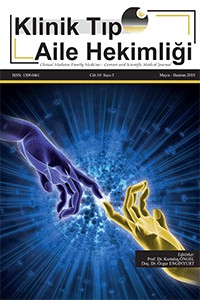Abstract
Abstract
Pituitary insufficiency is a complete or partial deficiency in the release of the anterior and/or posterior pituitary hormones. The causes of Pituitary insufficiency are generally divided into inherited and acquired causes. Acquired reasons include; neoplastic,traumatic, infiltrative / inflammatory, infections, vascular (Sheehan syndrome, pituitaryapoplexy, aneurysm), postoperative radiation exposure, drugs, functional and other reasons. Sheehan syndrome (SS), on the other hand, remains a rare health problem in developed countries and is a continuing problem due to inadequate postpartum care conditions in underdeveloped and developing countries such as our country. Sheehan syndrome is a pituitary insufficiency due to intrapartum or postpartum hemorrhage and hypovolemia. One of the known causes of Empty sella syndrome is Sheehan syndrome. Depending on the degree of damage to the hypophysis, symptoms may appear suddenly oryears later. The postpartum haemorrhage story, the interruption of menstruation and thedecrease in milk yield are important clues to the diagnosis. Early diagnosis and approp-riate treatment are crucial to reduce morbidity and mortality in these patients.
References
- Kaynaklar 1.Shivaprasad C. Sheehan syndrome: Newer advances. Indian J En-docrinol Metab 2011;15(Suppl 3):203-207. 2.Synder PJ. Diagnosis of hypopituitarizm. Uptodate 14;1:2006. 3.Oelkers W. Dose-response aspects in the clinical assessment of thehypothalamo-pituitary- adrenal axis, and the low-dose adrenocor-ticotropin test. Eur J Endocrinol. 1996;135(1):27-33. 4.Molvalılar S. Nöroendokrin regülasyon, ön hipofiz ve hipotala-musun hastalıkları. In: Sencer E (Ed). Endokrinoloji, Metaboliz-ma ve Beslenme Hastalıkları. Nobel Tıp Kitabevleri, İstanbul, 2001sayfa 22-63. 5.De Bellis A, Bizzarro A, Bellastella A. Pituitary antibodies andlymphocytic hypophysitis. Best Pract Res Clin Endocrinol Me-tab. 2005;19(1):67-84. 6.Ertürk E. Hipofiz görüntüleme yöntemleri. Türkiye Klinikleri2006,2 (37):62-66. 7.Keleştimur F. Sheehan’s syndrome, Pituitary 2003; 6: 181-188. 8.Keleştimur F, Auernhammer C, Çolak R, et al. The baseline cha-racteristics and the effects of GH replacement therapy in pati-ents with Sheehan’s syndrome as compared to nonfunctioning pi-tuitary adenoma. The Endocrine Society’s 85th Annual MeetingPhiladelphia, USA 2003:19-22. 9.Gölgeli A, Tanriverdi F, Süer C, Gökce C, Özesmi C, Bayram F,Keleştimur F. Utility of P300 auditory event-related potential la-tency in detecting cognitive function in growth hormone (GH) –deficient patients with Sheehan’s syndrome and effects of GH rep-lacement therapy. Eur J Endocrinol 2004;150:153-159.
Abstract
Öz
Hipofiz yetmezliği ön ve/veya arka hipofiz hormonlarının salınmasında tam veya kısmi eksikliğin olmasıdır. Hipofiz yetmezliğinin nedenleri genel olarak kalıtsal ve edinsel nedenler olarak ayrılır. Edinsel nedenler arasında; neoblastik, travmatik, infiltratif/inflamatuvar, infeksiyon, vasküler (Sheehan sendromu, pituiter apopleksi, anevrizma), postoperatif, radyasyon maruziyeti, ilaçlar, fonksiyonel ve diğer nedenler sayılabilir. Bunun yanında Sheehan sendromu (SS), gelişmiş ülkelerde nadir görülen bir sağlık sorunu olmakla birlikte, az gelişmiş ve ülkemiz gibi gelişmekte olan ülkelerde postpartum bakım şartlarındaki yetersizlik nedeniyle devam eden bir sorundur. Sheehan sendromuintrapartum veya postpartum kanama ve hipovolemiye bağlı gelişen hipofiz yetmezliğidir. Empty sella sendromunun bilinen nedenlerinden biri de Sheehan sendromudur. Hipofizin hasarlanma derecesine göre belirtiler aniden ya da yıllar sonra ortaya çıkabilir.Postpartum hemoraji öyküsünün olması, adet görmekten kesilme ve süt vermede azalma teşhiste önemli ipuçlarıdır. Erken konulan teşhis ve uygun yapılan tedavi bu hastalarda morbidite ve mortaliteyi azaltmak için oldukça önemlidir.
References
- Kaynaklar 1.Shivaprasad C. Sheehan syndrome: Newer advances. Indian J En-docrinol Metab 2011;15(Suppl 3):203-207. 2.Synder PJ. Diagnosis of hypopituitarizm. Uptodate 14;1:2006. 3.Oelkers W. Dose-response aspects in the clinical assessment of thehypothalamo-pituitary- adrenal axis, and the low-dose adrenocor-ticotropin test. Eur J Endocrinol. 1996;135(1):27-33. 4.Molvalılar S. Nöroendokrin regülasyon, ön hipofiz ve hipotala-musun hastalıkları. In: Sencer E (Ed). Endokrinoloji, Metaboliz-ma ve Beslenme Hastalıkları. Nobel Tıp Kitabevleri, İstanbul, 2001sayfa 22-63. 5.De Bellis A, Bizzarro A, Bellastella A. Pituitary antibodies andlymphocytic hypophysitis. Best Pract Res Clin Endocrinol Me-tab. 2005;19(1):67-84. 6.Ertürk E. Hipofiz görüntüleme yöntemleri. Türkiye Klinikleri2006,2 (37):62-66. 7.Keleştimur F. Sheehan’s syndrome, Pituitary 2003; 6: 181-188. 8.Keleştimur F, Auernhammer C, Çolak R, et al. The baseline cha-racteristics and the effects of GH replacement therapy in pati-ents with Sheehan’s syndrome as compared to nonfunctioning pi-tuitary adenoma. The Endocrine Society’s 85th Annual MeetingPhiladelphia, USA 2003:19-22. 9.Gölgeli A, Tanriverdi F, Süer C, Gökce C, Özesmi C, Bayram F,Keleştimur F. Utility of P300 auditory event-related potential la-tency in detecting cognitive function in growth hormone (GH) –deficient patients with Sheehan’s syndrome and effects of GH rep-lacement therapy. Eur J Endocrinol 2004;150:153-159.
Details
| Primary Language | Turkish |
|---|---|
| Journal Section | makaleler |
| Authors | |
| Publication Date | May 26, 2018 |
| Published in Issue | Year 2018 Volume: 10 Issue: 3 |


